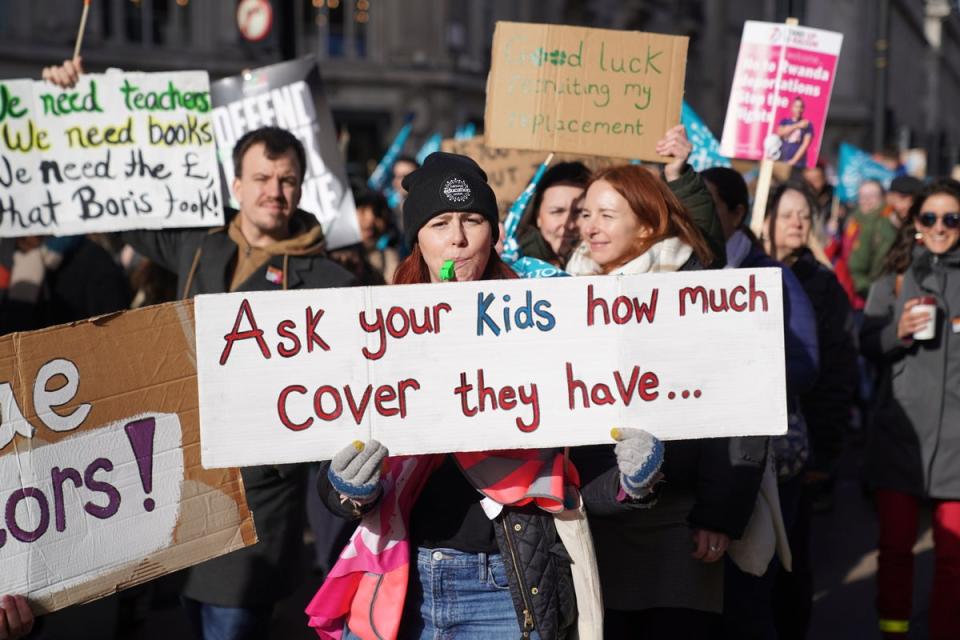‘Zombie’ teachers offered anti-depressants as ‘burnt out’ staff strike over pay
Thousands of schools across England and Wales have shut due to strike action as overstretched teachers describe working “like zombies” for little pay.
The majority of schools have been affected by the first day of walkouts by tens of thousands of National Education Union (NEU) members, according to a snapshot poll by a school leaders' union. Among the 920 schools and sixth-form colleges polled where teachers were on strike, just 11 per cent reported being fully open with all students on site.
Four in five (80 per cent) schools said they were partially open with some students on site and 9 per cent said they were completely shut during the strikes, the survey by the Association of School and College Leaders has suggested. Although some parents only found out on Wednesday morning if their children would have to stay at home.
Kemi Oloyede, assistant head teacher of a school in London, described helping one head of year of a different school who said she could not afford to feed her children.
Ms Oloyede, who is also founder of the Young Black Teachers Network (YBTN), said she and her team came together to buy the pastoral worker and other parents Tesco vouchers.
“How is it fair that someone who looks after other people’s children isn’t left with enough to take care of her own?” she asked. “Why would you not want to take care of those who take care of your children? I can’t give the best of myself to your child if I can’t take care of my basic needs.”

“During Covid, people wanted us to be glorified babysitters,” she continued. “We are mental health coaches, we are motivators, we are nurses, we are parents, but we are exhausted.
“We can’t be everything to everyone and then left with nothing to pour into ourselves.”
Also backing the walkout, Emmanuel Awoyelu said the experience he had as a teacher in the UK led to him leaving the country to find work overseas.

After considering leaving the profession for many years, the former assistant head teacher moved abroad to work as a special inclusion teacher. He described his decision to move as “purely financial”.
“I now have to think about my own children and not other’s people,” he said. “People don’t want to be heroes anymore, it doesn’t pay to be a hero.
“I don’t think parents would send their children to school if they knew what was happening behind the scenes.
“I have friends in senior leadership roles in schools who were offered anti-depressants. Teachers are operating like zombies. Some have resigned from teaching altogether.”

He claimed one of the main issues he faced as a teacher is the “lack of clear direction” from those at the top.
“Schools have reduced funds and tight budgets but the cost of living is going up,” he said. “As a result, the lack of resources for children is mind-blowing.”
An assistant head for a girl’s school in London echoed this sentiment, claiming “burnout” is common among disenchanted staff.

“People became teachers to make a social impact, but it is not worthwhile anymore,” the teacher, who did not wish to be named, said. “As rewarding as it can be, that doesn’t pay the bills.
“When I first started teaching, I loved going into work. I felt a connection with the students. But this started to fizzle out once the workload built up. I care less now because I’m at capacity, mentally and physically.”
The consequence this has on the students cannot be understated, she argued.
“When teachers are burnt out and tired, lessons become boring and meaningless,” she continued. “Then you get long absences from teachers, and there is constantly a huge turnover.”

The assistant head said her school is fighting a continuous long-term supply issue because staff are taking stress-related leave, with two members off for a minimum of six to eight weeks.
“Even students in the top sets will fall behind as a result,” she said. “This affects their GCSE grades with a domino effect on their A-Levels, their university admissions and their future in the job market.”
Civil servants, train and bus drivers and university staff also stopped work on the biggest single day of strikes in a decade.

The prime minister, Rishi Sunak struck a tough line on the school strikes at Prime Minister’s Questions. “When it comes to teachers, we’ve actually given teachers the highest pay rise in 30 years, that includes a 9 per cent pay rise for newly qualified teachers and record investment in their training and development,” he said.
“I am clear that our children’s education is precious, and they deserve to be in school today being taught,” Mr Sunak added.
Downing Street highlighted the government’s wish to hold more talks with unions to avert further strike action.


